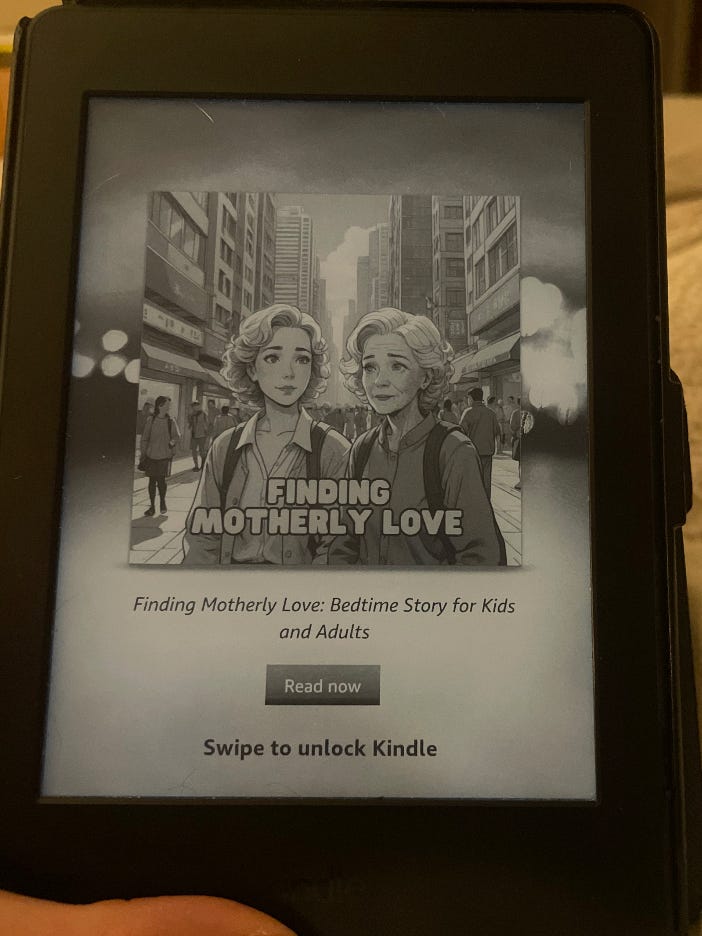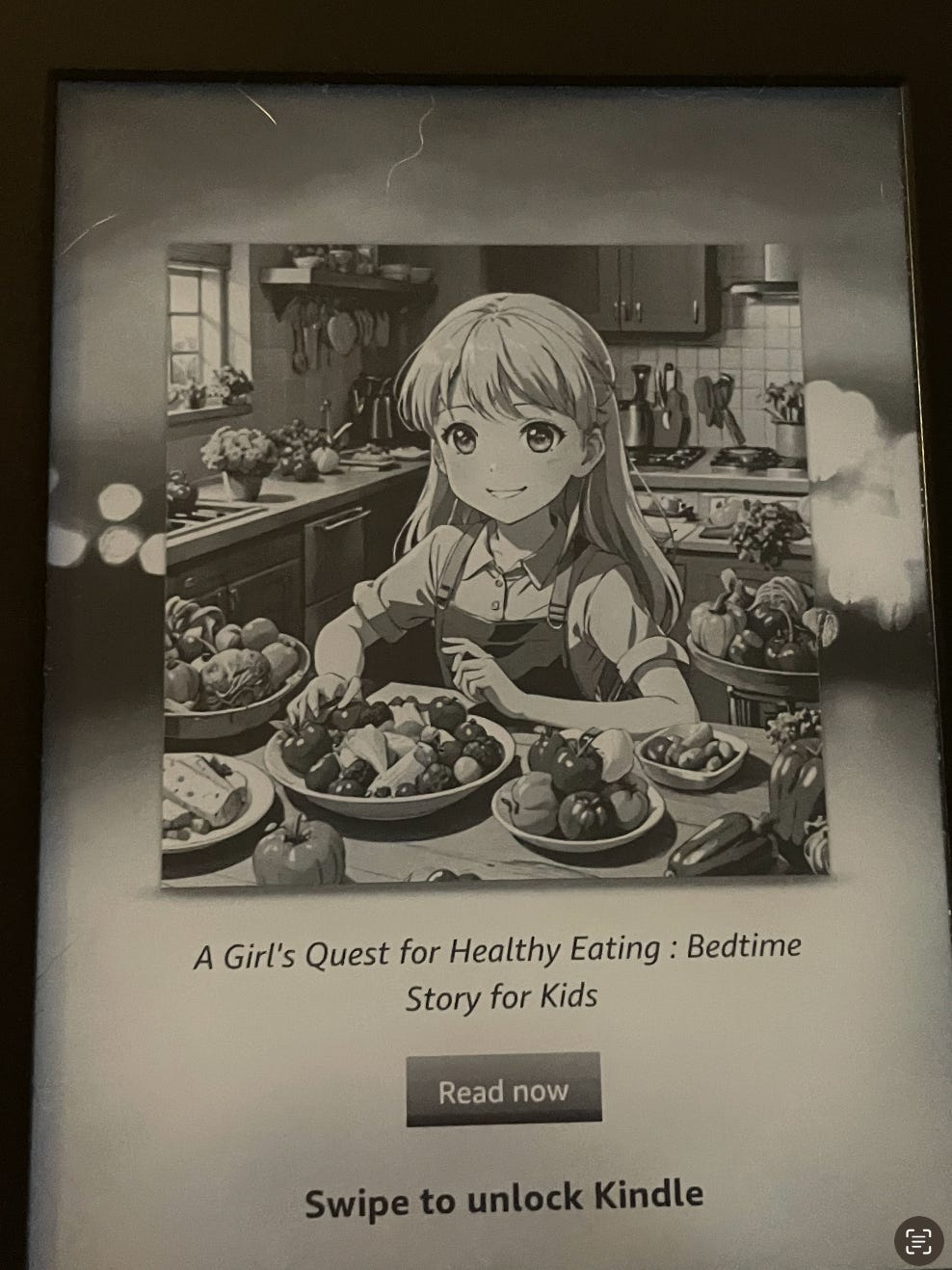Greetings from Read Max HQ, directly beneath the dreaded Heat Dome.
This week’s edition is a guest post about spooky Kindle A.I. slop from Leah Beckmann, an L.A.-based screenwriter and journalist and Chief Kindle Bullshit Correspondent for Read Max.
But first, some self-promotion I was on TrueAnon again this week, “chopping it up” on the subjects of Leopold Aschenbrenner, A.I., and my time as a “CTY” camper at Franklin & Marshall College in Lancaster, Penn. The episode is behind a paywall, but if there is any podcast worth paying for it’s TrueAnon.
I also had the pleasure of speaking with Jordan Heath-Rawlings about Google A.I. for The Big Story podcast, describing for my Canadian compatriots the Google A.I. answer fiasco.
And before we begin, a short reminder: Read Max is a fully1 reader-supported enterprise. The twice-weekly dose of criticism, reporting, shit-posting, recommendations, prophecy, fever-dream ranting, and photographs of my friend Leah’s Kindle relies on subscribers who like what I do electing to pay for the work that goes into it. If you think Read Max is worth about one beer a month, consider upgrading your subscription below:
My Kindle thinks I'm stupid now
By Leah Beckmann
The first time I had enough brain cells to read again, the baby was about eight weeks old. “Reading,” at this stage, could occur only in brief stretches between breast-feeding/rocking/attempting to psychically communicate with my infant to understand if I was doing any of this right, and before I slipped into blissful unconsciousness. I would stare at each word in sequence--“Rhys roared as he came, slamming to the hilt. Outside the mountains trembled.”--not retaining any of it.
The only thing that was able to cut through the fog of new parenthood were The Ads.
I’m not sure when, exactly, Amazon determined that I had lost the ability to read, but one day my Kindle lock screen was gently nudging me toward the new Lauren Groff, and the next it was pushing a series of books with the subtitle: "Bedtime Story for Kids and Adults."
It is immediately clear that no sentient being wrote these, uh, books, if that’s the right word. The lifeless covers feature anime-style illustrations--dewy-eyed children, snarling dragons, a cat dressed as a scientist--and have bland titles that make you think, “Hey yeah! That makes sense,” and then immediately, “wait, no it doesn’t.”
It has been hard not to take this personally as a new mother. Did Amazon sense that my liquified brain could no longer digest real books? Based on my recent purchases of “Mary Ruth’s Infant Probiotic Drops” and “Frida Mom Cooling Hydrogel Nipple Pads” and “Skip Hop Baby Bath Rinse Bath Cup - Whale,” did Amazon suddenly assume that I needed something a little gentler than Miranda July or Maeve Binchy or even the softcore fairy pornos written by Mormons? More importantly, what is a bedtime story for kids and adults? I am an adult. A bedtime story for an adult is just a real book. I read real books. Or at least, I used to? Basically, did Kindle think I was stupid now?
Well, yes.
The night I was served A Girl’s Quest For Healthy Eating, I thought, Fine. Why fight it? Why not just lie down in the parking lot of semi-literate Bedtime Story and let a 24-page Kindle text written by a robot run me over repeatedly?
I looked into the big, vacant eyes of the smiling girl on the cover, and--like the moment a Magic Eye reveals itself to you--he transformed from sinister to welcoming. Maybe, I thought, Amazon knows something I don’t. Motherhood is about learning to read the rhythms of your child and then reacting appropriately. Like an algorithm rapidly interpreting my behavior on the internet, every day I learn more and more about when my infant son needs to eat or sleep or practice tummy time. If I am mommy… could Amazon also be mommy? Is Amazon my mommy? Maybe Amazon is just trying to do me a solid and let me know that it knows what’s best for me, and what’s best for me right now is Students Perilous Journey to Correct Their Mistake.
Maybe it really is just time to read a bedtime story and go night-night.
So I went to the book details page for A Girl’s Quest For Healthy Eating. I learned that it was written by someone named Bette Santini. It has a two and a half star rating, is 33 pages long and was published on May 7, 2024. For just $2.99, it could be mine. The brief bio read: A little girl with blue eyes and blonde hair leads her friends on a healthy eating mission, culminating in the creation of a neighborhood farmer’s market.
Okay. Sort of Triumph of the Will: Bedtime Story for Kids and Adults.
What else could this sick and twisted mind have cooked up? I wanted more. I clicked on Bette’s author page; this was the only title listed. Through the penumbral fog of half-sleep, squinting one-eyed at my phone, I googled, “a girls.quest for healthy watinf bette santinir.” Even the politely auto-corrected version yielded no meaningful results: An obituary for a Betty L. Santini. A vintage Santini cycling jacket on eBay. An Amazon link to the book, The Prince of Tides. Not only would it seem that Bette Santini does not exist, but there is no possible way to purchase or even locate A Girl’s Quest for Healthy Eating, outside the Kindle app.
And then things got spooky. When I opened my Kindle again, there, illuminated by the inoffensive whitish glow of my device, was an ad for A Girl’s Quest for Healthy Eating. Only, it was vaguely distorted. Like a spot-the-difference Highlights game, here was the same book with minor discrepancies. This cover featured several little girls, presumably all on healthy eating quests of their own. The page count was slightly different. And most distressing of all, the author's name: Bette Santinir. In other words, Santini plus R. Where had I seen this name before? Oh right: from one minute ago when I misspelled Santini, Santinir.
So. Was Amazon somehow generating these books as quickly as I could search for them? Probably not. I even tried googling purposely misspelled versions of books to try and bait the system. But Pwaw Dtetctives: Maserty of the Missng Ncklac bedtma story kids and adults (Paw Detectives: The Mystery of the Missing Necklace: Bedtime Story for Kids and Adults) got me nothing. Was I going insane? Almost certainly. As the very editor of this Substack texted me, “If you didn’t have pics of this, I would think you were schizophrenic.”
After some very minimal poking around, I learned that others had also been served versions of Bette Santini books. But no one seemed to know why the ads started in the first place or how to make them stop. The real question is this: Where do these books come from? Is someone out there generating piles of content via A.I. and trying to turn micro-profits by gaming the Kindle marketplace and placing ads? Is Amazon cutting out the author middle man and using A.I. and user data to generate books on its own? What generative models are being used? What kinds of prompts are generating these texts?
I don’t know. I’m not a virgin. As I said, I have a child.
But I did want to read about my nice Nazi Youth friend and her farmer’s market journey, I just couldn’t. I mean I literally could not find the book again. All versions of A Girl’s Quest for Healthy Eating appeared to have vanished, as though it never existed in the first place. (Is Amazon deleting these spammy books as fast as they can be generated? Again, I don’t know. Stop asking me questions for dorks.) At a loss, I decided to purchase and read the next book Amazon served to me. What I got was:
Using Mindreading for Good: Cute Fairy Tale Bedtime Story for Kids, written by Lynnell Gorshteyny, is about a young girl named Olivia who goes to sleep one night and wakes up with the ability to hear the thoughts of others around her. “At first,” the robot Lynnell Gorshteyny generates, “she thought she was going crazy, but soon realized that she had acquired the ability to read minds.”
Here is a photo of Olivia thinking she was going crazy, but soon realizing that she had acquired the ability to read minds.
Olivia’s only friend in the world is Zoe.
Zoe helps Olivia harness her new power so that she can use it for good. Such as helping Ethan, some random dumbass at school who is struggling with his grades. By having access to his thoughts, Olivia is able to identify what exactly he’s struggling with, which “made tutoring sessions more productive.” The next day, the robot Lynnell Gorshteyny has forgotten that the main character is named Olivia. “Next, they helped their classmate, Olivia, who was dealing with a fallout with her best friend. Olivia could perceive both sides of the argument.”
Whatever. You get the point. The book goes on and on, reminding us over and over of the power of empathy: that we must empathize with each other, that we must be empathetic towards each other, and how “most importantly, Olivia is an empath now.” In fact, the word empathy is mentioned 10 times in 35 pages. Every time I thought I had reached the book’s natural conclusion – “Her powers were gone, but she was also glad for the silence.” Big sigh. We’ve done it. – I would turn the page only to learn once again that “Olivia’s journey as a mind reader taught her valuable lessons.”
But what about the valuable lessons I’ve learned? Well, as of this morning, I’ve started receiving ads for a different genre of AI reads. Let’s call these the “Flight of Hope’ series.
Hope indeed. What is parenting anyway if not a soaring tale of courage, wisdom, and compassion? Flagrant hope in the face of the unbearable, unspeakable state of the world. A sacrifice of brain and body so enormous, it is impossible to quantify. And while I know that the old version of my brain is certainly gone forever, I do hope that I regain the ability to read someday. If only so that, in a couple of years from now, in a time that feels both immeasurably far but that I’m aware will arrive sooner than I can imagine, my son and I will snuggle up together in his bed, we will open up his personal tablet, and I will read him several Bedtime Story before he drifts sweetly off to sleep.
Except for the one time we had ads, and the $130 I made last year from affiliate sales.

















Personal favorite that I've been served: "Pills From Tree" .. "What if the trees in your garden prescribe pulls to solve your problems"
On one hand .. you have my attention. On the other .. what the actual fuck?
This liquefied my brain thank you